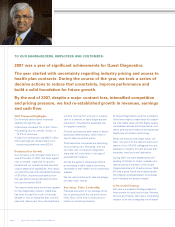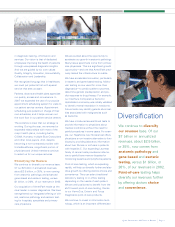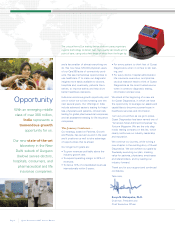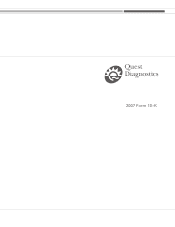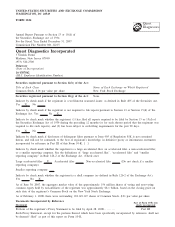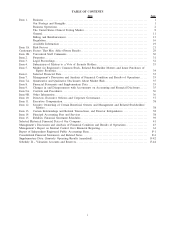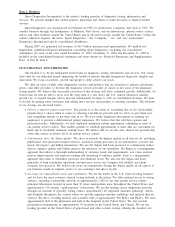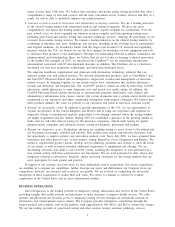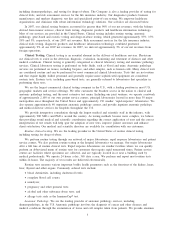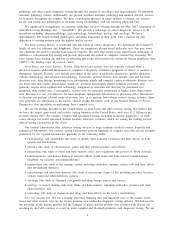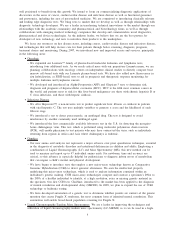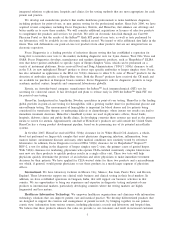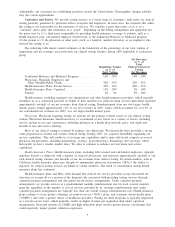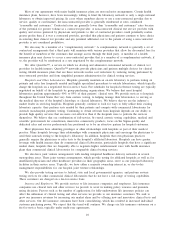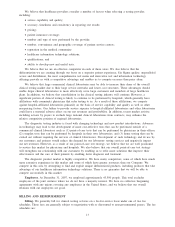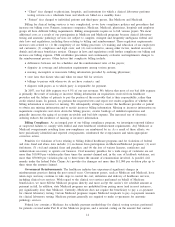Quest Diagnostics 2007 Annual Report Download - page 13
Download and view the complete annual report
Please find page 13 of the 2007 Quest Diagnostics annual report below. You can navigate through the pages in the report by either clicking on the pages listed below, or by using the keyword search tool below to find specific information within the annual report.pathology and other cancer diagnostic testing through our centers of excellence and approximately 40 outpatient
anatomic pathology centers. Additionally, we provide inpatient anatomic pathology and medical director services
for hospitals throughout the country. We have a substantial presence in target markets to deliver our services
locally and enable our pathologists to establish strong relationships with our referring physician base.
We significantly strengthened our anatomic pathology services offering through our May 2007 acquisition of
AmeriPath Group Holdings, Inc., (“AmeriPath”). We provide a full-range of cancer diagnostic services to all
specialties including: dermatopathology, gastroenterology, hematology, urology and oncology. We have
approximately 800 board-certified pathologists, including luminaries in their field, with a passion for and
dedication to serving patients with the highest quality service.
We have a strong history of leadership and innovation in cancer diagnostics. We introduced the Leumeta
family of tests for leukemia and lymphoma. These are proprietary plasma-based molecular tests that may some
day eliminate the need for painful bone marrow biopsies. We offer Pap testing using liquid-based technology in
addition to conventional Pap testing and provide physicians the option of computer assisted Pap screening. We
were among those leading the industry in educating physicians about molecular testing for human papilloma virus
(“HPV”), the leading cause of cervical cancer.
Gene-Based and Other Esoteric Testing. Gene-based and esoteric tests are typically ordered when a
physician requires additional information to complete a diagnosis, establish a prognosis or choose or monitor a
therapeutic regimen. Esoteric tests include procedures in the areas of molecular diagnostics, protein chemistry,
cellular immunology and advanced microbiology. Commonly ordered esoteric tests include viral and bacterial
detection tests, drug therapy monitoring tests, autoimmune panels and complex cancer evaluations. Esoteric tests
are those tests that require professional “hands-on” attention from highly skilled technical personnel, that
generally require more sophisticated technology, equipment or materials and that may be performed less
frequently than routine tests. Consequently, esoteric tests are generally reimbursed at higher levels than routine
tests. Because it is not cost-effective for most hospitals, independent laboratories or physician office laboratories
to develop and perform a broad menu of esoteric tests, or to perform low-volume esoteric testing in-house, these
tests generally are outsourced to an esoteric clinical testing laboratory, such as our Nichols Institute or Focus
Diagnostics, that specializes in performing these complex tests.
We are the leading provider in the United States of gene-based and other esoteric testing. We believe that
we have the largest gene-based and esoteric testing business in the United States, with over $1.2 billion in net
revenues during 2007. We conduct complex and specialized testing, including molecular diagnostics, on both
coasts through our world renowned Nichols Institute laboratory facilities, which are among the leading esoteric
clinical testing laboratories in the world.
Our esoteric laboratories offer reference testing services to large academic medical centers, hospitals and
commercial laboratories. Our esoteric testing laboratories perform hundreds of complex tests that are not routinely
performed by our regional laboratories, generally in the following fields:
•endocrinology and metabolism (the study of glands, their hormone secretions and their effects on body
growth and metabolism);
•genetics (the study of chromosomes, genes and their protein products and effects);
•hematology (the study of blood and bone marrow cells) and coagulation (the process of blood clotting);
•immunogenetics and human leukocyte antigens (HLA) (solid organ and bone marrow transplantation;
eligibility for vaccines and immunotherapy);
•immunology (the study of the immune system including antibodies, immune system cells and their effects
and autoimmune diseases);
•microbiology and infectious diseases (the study of microscopic forms of life including parasites, bacteria,
viruses, fungi and other infectious agents);
•oncology (the study of abnormal cell growth including benign tumors and cancer);
•serology (a science dealing with body fluids and their analysis, including antibodies, proteins and other
characteristics); and
•toxicology (the study of chemicals and drugs and their effects on the body’s metabolism).
New test introduction. We are a leading innovator, bringing new and improved tests to the market. Gene-
based and other esoteric tests are the fastest growing area within the diagnostic testing industry. We believe that
the unveiling of the human genome and the linkages of genes and the proteins they produce with disease are
resulting in, and will continue to result in, more complex and thorough predictive and diagnostic testing. We are
4



